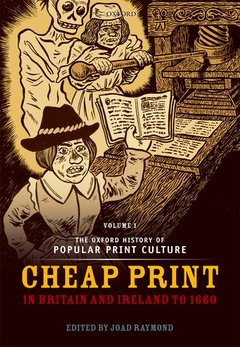Description
The Oxford History of Popular Print Culture
Volume One: Cheap Print in Britain and Ireland to 1660
The Oxford History of Popular Print Culture Series
Coordinator: Raymond Joad
Language: English
Publication date: 04-2011
704 p. · 18.1x25.3 cm · Hardback
704 p. · 18.1x25.3 cm · Hardback
Description
/li>Contents
/li>Biography
/li>Comment
/li>
What did most people read? Where did they get it? Where did it come from? What were its uses in its readers' lives? How was it produced and distributed? What were its relations to the wider world of print culture? How did it develop over time? These questions are central toThe Oxford History of Popular Print Culture, an ambitious nine-volume series devoted to the exploration of popular print culture in English from the beginning of the sixteenth century to the present. Between the beginning of the sixteenth century and the later seventeenth, governments, institutions and individuals learned to use inexpensively-produced printed texts to inform, entertain, and persuade. Cheap print quickly became rooted in British and Irish culture, both elite and popular. This substantial and authoritative collection of essays - the first of its kind - examines the developing role of popular printed texts in the first two centuries of print in Britain and Ireland. Its forty-five chapters (with sixty-six illustrations) look at a broad range of historical and social contexts, at comparisons with other European countries, at the variety of content and themes in cheap printed texts, the forms and genres that developed with and were used by cheap print, and concludes with a series of case studies exploring the role of print in particular years. The book takes none of these terms - Popular, Print, Culture - for granted, but interrogates each of them with a rich, contoured picture of the relationship between a popular readership, the materiality of books, the economy of the book trade, and political and cultural history. Its forty-two contributors come from different disciplines and with expertise in fields from political and book history, through visual and material culture, to rhetoric and literature. These contributors do not all agree on definitions, or on the history that underlies them, but instead establish the ground for future debates and examinations of the role of cheap print in early-modern Britain.
Preface. List of Tables. List of Illustrations. Notes on Conventions. Notes on Contributors. Chronology. 1. Introduction: the origins of popular print culture. Part one: Historical Contexts. 2. England and Wales. 3. Scotland. 4. Ireland. 5. Popular, Plebeian, Culture: Historical Definitions. 6. The Development of the Book Trade in Britain. 7. Printing, Learning and the Unlearned. 8. Popular Literacy and Society. 9. Reading Strategies. 10. Oral Culture and Popular Print. 11. Manuscript Culture and Popular Print. 12. Libel. 13. The Social Life of Books. Part two: Some International Comparisons. 14. France and Spain. 15. Italy. 16. The Netherlands. 17. Germany. Part three: Themes. 18. Religion and Cheap Print. 19. Rhetoric. 20. Political Argument. 21. Images, Representation, and Counter-Representation. 22. Women and Print. 23. London. 24. Parliament and the Press. 25. War. Part four: Forms and Genres. 26. Ballads and Broadsides. 27. Romance. 28. News. 29. Science. 30. Popular Medical Writing. 31. Almanacs and Prognostications. 32. Popular History. 33. Pamphlets. 34. Chapbooks. 35. Sermons, Primers, and Prayer Books. 36. Popular Didactic Literature. 37. Playbooks. Part five: Case Studies. 38. 1535. 39. 1553. 40. 1588-9. 41. 1603. 42. 1625. 43. 1641. 44. 1649. 45. 1660. Bibliography.
Joad Raymond is Professor of English Literature at the University of East Anglia. His work explores early newspapers, politics, religion, and literary history, and the connections between these. Previous books include The Invention of the Newspaper (OUP, 1996), Pamphlets and Pamphleteering in Early Modern Britain (CUP, 2003), Milton's Angels: The Early Modern Imagination (OUP, 2010) and various essays and edited books. He is presently editing Milton's Latin Defences for The Oxford Complete Works of John Milton, and also working on a project investigating early-modern international news networks.
a sophisticated, balanced overview of the current state of research into the social, cultural and political role popular print played in early modern Britain ... it will prove to be indispensible for scholars researching the cultural history of this period, as well as for librarians whose role it is to preserve these ephemeral relics of the past for future generations.
© 2024 LAVOISIER S.A.S.
These books may interest you

Brazilian Woodcut Prints 53.83 €



